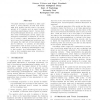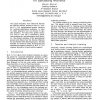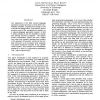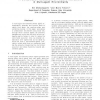IJCAI
1993
14 years 4 months ago
1993
IJCAI
1993
14 years 4 months ago
1993
Traditional algorithms for prime implicate generation [Quine, 1952; McCluskey, 1956; Tison, 1967; Kean and Tsiknis, 1990; de Kleer, 1992] require the input formulas to be first tr...
IJCAI
1993
14 years 4 months ago
1993
This paper describes how meta-level theories are used for analytic learning in M U L T I - T A C . M U L T I - T A C operationalizes generic heuristics for constraint-satisfaction...
IJCAI
1993
14 years 4 months ago
1993
Our experience in the IDAS natural language generation project has shown us that IDAS'S KLONE-like classifier, originally built solely to hold a domain knowledge base, could ...
IJCAI
1993
14 years 4 months ago
1993
These notes discuss formalizing contexts as first class objects. The basic relation is ist(c, p). It asserts that the proposition p is true in the context c. The most important f...
IJCAI
1993
14 years 4 months ago
1993
In multi-agent environments where agents independently generate and execute plans to satisfy their goals, the resulting plans may sometimes overlap. In this paper, we propose a co...
IJCAI
1993
14 years 4 months ago
1993
Human chess players exhibit a large variation in the amount of time they allocate for each move. Yet, the problem of devising resource allocation strategies for game playing did n...
IJCAI
1993
14 years 4 months ago
1993
IJCAI
1993
14 years 4 months ago
1993
Many problems can be expressed in terms of a numeric constraint satisfaction problem over finite or continuous domains (numeric CSP). The purpose of this paper is to show that the...
IJCAI
1993
14 years 4 months ago
1993
In this paper a framework is developed for measuring the complexities of deductions in an ab stract and computationally perspicuous man ner. As a notion of central importance ...





